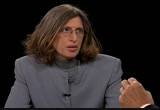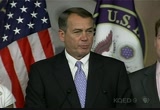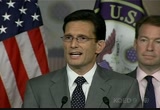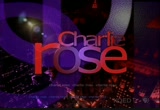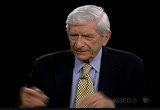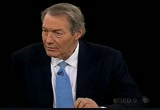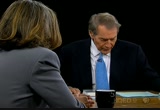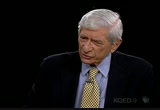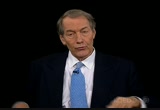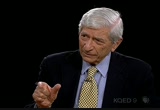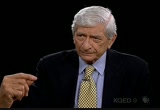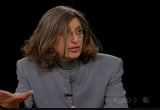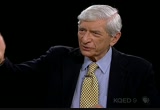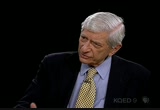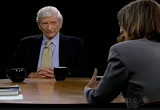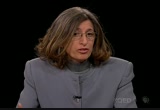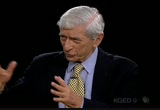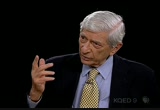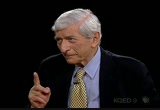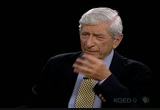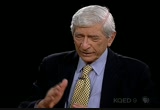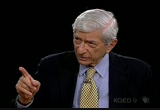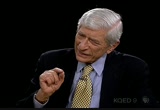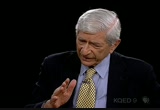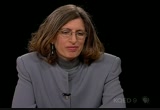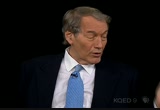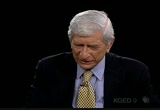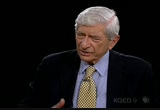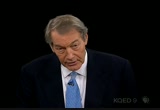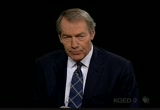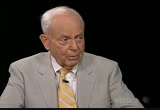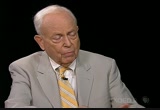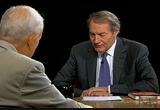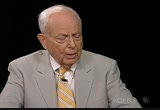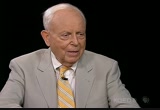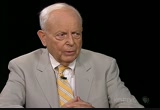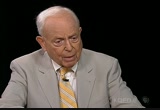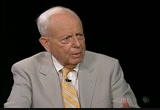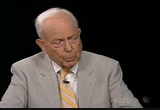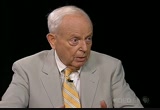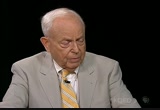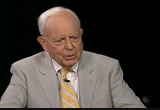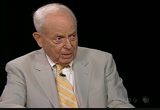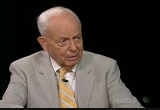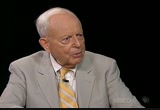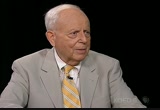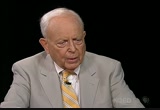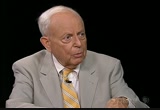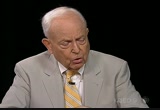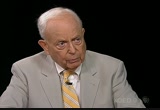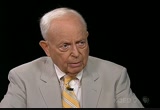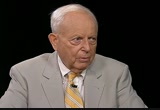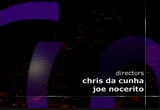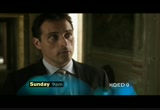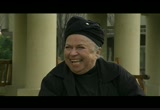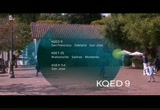tv Charlie Rose PBS July 29, 2011 12:00am-1:00am PDT
12:00 am
>> rose: welcome to our program. tonight we take a quick look at the ticktock in the debt limition talks in washington. >> when the house takes action today, the united states senate will have no more excuses for inaction. the bill's not perfect. i've never said it was perfect. nobody in my caucus believes it's perfect. but what this bill reflects is a sincere, honest effort to end this crisis in a bipartisan way, to send it to the senate where it can receive action. >> rose: we ctinue this eveng with marvin kalb and his daughter deborah kalb. they have written a book about the legacy of vietnam called "haunting legacy." >> one of the most difficult things about "haunting legacy," charlie, is to try to understand what is it that presidents go
12:01 am
through when they make major decisions about war and ace? these are human beingsnd they have fears andin obama's mind, not only the first black president in american hiory and that's on his min too is something that he cannot be careless about. >> we start withresidentord as the war wa ending and we do chapter on each president up president obama and eac president was affected by that war in terms of both his personal life, his experiences, his politics in terms of the campaign and primarily his foreign policy decision making. >> rose: wcontinue this evening with david wise, who's written another book about espionage. it's about chinese and american espionage and it's called "tiger trap." >> the chinese spy very differently than, for example, the k.g.b., or now the s.b.i.,
12:02 am
as it's called. the chinese have been at this much longer than we have. they've been at this at least for... >> rose: they've been at everything much longer than we have. >> y. they've been at this at least since 400 b.c. and the art of war, sun soviet ion and so they've been a it for 25 centuries. we've been at it since 1947 c.i.a. was cread. >> rose: the day in washgton, marvin and deborah kalb and david wi when we continu every story needs a hero we canll root for. who beats the odds and cos out on top. but this isn't just a hollywood storyline. it's happening every day, all across america. every time a storefront opens.
12:03 am
or the midnight oil is burned. or when someone chases a dream, not just a dollar. they are small business owners. so if you wanna root for a real hero, support small business. shop small. ptioning sponsored by rose communications from our stuos inew york city, this is charlie rose. >> ros the debt limitation end game is being played out in washington today, tomorrow, saturday and sunday. the deadne is august 2. the house of representatives and the senate are involved, but not even the parties know exactly where the end game will end. earlier th evening, the house of representatives delayed a
12:04 am
vote o legislationroposed by speaker john boehner. the plan would cut federal spending by $917 billion over e next decade. it would also provide an immediate debt limit increase of $900 billion. earlier today, speaker boehner pleaded with congress to pass the bill. >> listen, for the sake of jobs, for the sake of our country, i'm asking the representatives in the house in a bipartisan way and asking my colleagues in the senate. let's pass this bill and end this crisis. >> rose: white house perez secretary jay carney said the plan wouldn't make it past the senate. >> the senate will reject the boehner bill but as has been made clear by not just democrats but a number of republicans who reject the boehner bill in the senate. they reject it, okay? so there is no question that this bill is a political act. it has no le beyond its current existence in the house. >> rose: senate majorit leader
12:05 am
harry reid said the bill was only a short-term fix. >> replicans cannot get the short term band yayladagi they will vote on in the house today. it will not get one democratic vote in the sate. we have five days remaining until a few extremist republicans-- an note, i say a few-- drive o economy off a cliff because theye too radical and inexperienced to coromise. >> ro: eric canr responded to harry reid. >> the way i s it is harry reid has three different options: one is to ffer the economic consequences of default which i hope, whichll of us hope he doesn't choose. two is to bring up the bill that we sent prior, the one that he claims to be opposed to. or to accept the compromise bill that we are sending over today so we can resolve this crisis and get on about the business of this country. >> rose: and then democratic house minority leader nancy
12:06 am
pelosi weighed in with her ideas. >> i believe the real reason it didn't connect is because the republicans all along have used deficit reduction as anxcuse for the unveling of progress made for the middle-class over the past 50 years. >> rose: so there we are. what will one side do and what will the other side do in? the debate continues. lots of questions like wre is the esident? stay tuned. it has been nearly 40 years since the war in vietnam ended but its legacy remains. many stillseek to understand vietnam and the lessons learned from the conflict. marvin kalb and his daughte borah kalb have co-authored a bookn the war. it is called "haunting legacy." i am pleased to have them at this table. welcome. marvin kalb is an old friend and colleague at cbs and i am pleased to meet deborah. thank you for coming. what's the origin of the book?
12:07 am
>> the origin of the book probab goes way back to m covering the war, debbie's interest in the war when she was a student. but the book itself was formed in the aftermath of the 2004 election. in that election, we had a swift boat veterans for truth and they were set up in their minds as a way of destroying john kerry. not only destroying him as a presidential candidate but just destroying him. and i got fascinated... >> rose: motivated by politics? >> motivated by a belief that he was phony, that he was treasonous, that the kind of criticism that he made of the vietnam war was something that only a person sympathetic to north vietnawod ever do. and and i began and then with debbie's help began to interview the people who ran the swift boat veterans and admiral hoffman who was the leader and i think a rather interesting man.
12:08 am
and then we got more deeply into vietnam and i was thinking about doing a book on the swift boat veterans. and then it turned out that very few people have an interest in the swift boat veterans or even vietnam. >> rose: right. >> the following year when debbie gets into the act in a serious way we began to think about her ideas and mine and collaborate d put it into a book which ended up as "haunting legacy." >> rose: have you collaborated before, ever? >> no... >> ever since she was born. (laughter) >> rose: was it inevitable that you would become a journalist, do you think? >> i think so. i mean, i think growing up in a family with my father being a t.v. reporter, my uncle. it was... >> rose: it was in the air. >> it was in the air to go into journalism in some way. i ended up on the print side. >> rose: and so here we are. and you call it "the haunting legacy." why "the haunting legacy"?
12:09 am
>> it's something that really haunts ever president since the war ended. so we start wit president ford as the war was ending and we do a chapter on each president up to president obama. and each was affected by this war in terms of both his personal life, his experiences, his politics in terms of the campaign and primarily his foreign policy decision making. >> rose: define what you think... not the legacy... or the legacy, the first war that amera had lost. >> the two key points, charlie. it's a very key point. we hadeen so fortunate throughout american history. we had not lost. we won. we won wars. >> rose: george baconave the best advice. >> declare vtory and then go home. right. but when america lost in 1975-- and it's an interesting point to discuss, because there are still many people who are going to watch this program and say "we didn't lose in vietnam.
12:10 am
the congress pulled the money and therefore we could not have won." okay. there's something very valid and very poignant about that point of view. i just they whether the congress pulled the money, whether the pentagon had the wrong strategy, whether the presidents themselves were wrong in theay which they viewed the cold war and our position in vietnam as part of that cold war. whever it was, we, the united ates of america, lost. and because it was the first war we ever lost and because we we and remain a great power, how does a great power-- a key qution. how does a great power adjustto a major military loss? how does it affect the politics? w does it affect the personalities of these people? >> rose: so if you look for historical precedent, wher do you go and wha disdo you discover? not vietnam in america butther historicalrecedents.
12:11 am
>> germany in the 20th century beat twice. what do you do? the first time you go into a deep depression leading to hitler. >> rose: right. >> and the second time you are beaten what do you do? you become a democracy and a flourishing one. >> rose: r rebuild from the bottom. >> you rebuild from the bottom. and japan went through the same kind of thing. china. so as great powers lose they also learn a great deal about themselves. >> rose: okay but there's differences here. number one, what i was thinking about-- even though it collapsed for her reasons l-- was the soviet union in afghanistan >> ah, yes. and that is a very important part of "the haunting legacy" because chapter 3 with carter and really right up through with reagan and bush one, vietnam and afghanistan have been sort of intellectually married and why do i say that? because zbigniew brzezinski whom you know very well and has
12:12 am
undoubtedly many on this program many times, brzezinski when he wasnational security advisor to prident carter, we were very fortunate. we got ahold of hisecret wall streeting memos to carter about what he thought carter ought to do in foreign policy. zbigniew brzezinski actually had in his mind that if we could suck the russians in more deeply into afghanistan we could create what he called heir vietnam." and in his mind, that kind of a loss, soviet troops in humiliation, having to leave afghanistan to go back to the soviet union loaded up with drugs, terrible shape, the equipment absolutely destroyed, they went back and in spig's mind, this could lead to the disintegration of the communist power in the soviet union because the red ar is the core the strength, the inner strength
12:13 am
it was of the soviet system. you destroy that, you destroy the syem. >> rose: and you destroy the self-esteem. >> and he wanted very much to destroy the soviet union. the other side of that is... that was brilliant. but the other side of that is that what we were using were the people, the mujahadeen, the fighters, the islamic radicals and fanatics who are literally the same people, unfortunately, that we' fighting today in afghistan. >> rose: what was it that bush 43 said about vietnam when he talked about iraq >> wl, bush... president bush george h.w. bush-- lked about buing the ghost of vietnam in the sands of arabia. >> rose: yes. >> that was george h.w. bush. >> ros bush 41. >> yes, we have burned the legacy of etnam... >> in theands of arabia. >> rose: and he meant to say at that time? >> yeah, i mean at the time... and bu w 1as the president who you could say he did learn the
12:14 am
lessons of vietnam in a lot of ways in the gulf war, the first gulf war. he did not pursue saddam hussein to try to get rid of him. he stopped in terms of getting saddam hussein out of kuwait, he succeeded in that. he sent a massive buildup of troops to do that, about a half million troops when he did not need that many but he wanted to go in, get it done, do it quickly and then pull out and that was that. and at the time, the idea was, well, we're done with vietnam. we've buried vietnam, we are through with it. and, of course, that was not true. >> rose: here's a man who probably had as much foreign policy experience as anye, having been ambassador, having been at the u.n., having been in china, having been vice president, is cognant of th legacy of vietnam. the haunting legacy of vietnam. >> well, remembe, debbie was just pointing out that h strategy was based on the powell doctrine. >> rose: right. which is based on the weinberger doctrine. >> the weinberger doctrine which
12:15 am
emerged as the experience of vietnam. >> rose: right. >> and what george h.w. bush came up with was this idea that powell was absolutely right. that if you go to war, you go in with overwhelming military force. yochoose the timing and you get out when youant to get out but make sure it's don fast. and then you're out. d this whole idea of going on up into baghdad, he... scowcroft brent scowcroft, his national security advisor, was saying, mr. president, we dent want to go there. we don't want to go there because once again we could get sucked into sometng and eve if scowcroft did not use specifically the word "vietnam," he didn't have to. all of the stuff that was going on at that time screamed out "you go there, kid, you're going to get yourself trapped. you're going to put yourself
12:16 am
into the kind of mess we were in in vietnam and we mply don't want that again." once president bush finished with the war, almost justifiably you can sort of read his mind at that time that he was saying "vietnam, done." except it wn't. and when you get to clinton, when you get to his son, bush 2, when you get to obama you find that in almost every single major foreign policy decision vietnam sits there sometimes like an uninvited guest. >>ose: okay. how do you think vietnam influenced this president who was, what, 16? >> he was 13 when the war ended. >> rose: okay, 1 >> he couldn't very well have... >> rose: he never felt what it was about and probably was not living in the united states. >> he was 13 when it ended so he was not affected the way the other presidents were as adults. >> rose: so how does it affect him today, though? >> it's interesting. because in his campaign he
12:17 am
talked about the 60s are done, i'm a post-'60s president and yet in 2008 when he went on a tour to iraq and afghanistan at that point he went with two senators, to colleagues, chuck hagel and jack reid, it was a bipartisan group and on the long flight... >> rose: both have been military officers. >> yeah. and he quizzed them about vietnam because he spoke with both of them and, you know, what was he asking them about? it was vietnam. the whole long flight over to the middle east. >> rose: so what was he asking them. >> he was asking them about... >> rose: because this is the core of the legacy. >> exactly. >> the lessons of the war. what is it... if i become president of the united states, he asked the two senators, what is it about vietnam that i really is to know and learn and make it part of me so that i don't make the same mistakes in afghanistan. that was very much on his mind. >> rose: it is that sort of process ao-- you and i were
12:18 am
talking about him as a leader-- at made him so attractive as a leader. he was askin questions "what are the lessons here?" >> absolutely. >> rose: and where today h is is a diffentuestion but continue with that. he wanted to know what are the lessons herend how do i avoid whatever the trap of vietnam was? >> right. and as he's been making decisions about afghanistan, he has been... you can see tt vietnam was on h mind when he was making the speech in terms of... >> rose: when he was going through the famous review that took a rather long time. >> exactly. that took a long time because he wanted to be sure he did it right and got all the information, got all the facts, wasn't blindsided by anything. and he referred to vietnam in the speech when he announced what he was going to do. >> rose: what did he say in >> he talked about how this was not like vietnam. and, in fact, in his first meeting with his national security team he said "afghanistan is not vietnam." and he had advisors, for example, in the late richard holbrooke who was very, very, very influenced by vietnam. it was during his time as a
12:19 am
young foreign service officer. >> rose: first national service advisor with geral jim jones who had experience. >> had been there twice. >> so i think a lot of people around him had been affected by vietnam. >> rose: but the legacy was not to get so involved in a way that would have such a pervasive impact on the country in a way that made it such a losing experience. >> but it's not... that's a very generous way of putting a presidential thing. >> rose: it's more? >> it's much more than that. vietnam represents loss w. no democrat-- particularly no democrat with any military experience... when barack obama came in, you could put what he knew about the military into a thimble. he was not a person steeped in the military. so although he has a marvelous way of speaking and he has a wonderful self-confidence the
12:20 am
fact is he is aware, he's a very smart guy and he reads a lot of history. he knew what happened in 1949 with the loss of china. >> rose: right. well, for a generation people said "who lost china." >> exactly. and he did not want to be the esident whlost another war. so from day one he wanted everybody to understand that this is a war that we-- me, barack obama-- is not going to lose. so what do you do? he triples the size of the arm force in afghanistan did he have to do that? that's a question. >>ose: well, there's an alternative argument which is not do that, not have a surge and, in fact, articulated by joe biden the vice president which said "make it counterterrorism not counterinsurgency." >> absutely. and that kind of an argument just infiltrated the white house. bruce rydell, who wrote his first report on afghanistan told us that... terrific, terrific
12:21 am
guy and he told us that vietnam walked the halls of the white house. wherever he bumped into somebody he would bump into somebody who would say, hey, is this vietnam? obama himself, charlie, would on occasion, we were told, stop in to the office of one of his senior advisors at the white house, is close the door, sit at the edge of the guy's desk and say "am i doing what lyndon johnson did in the '60s? we cannot do that." >> rose: with afghanistan? >> with afghanistan. am i doingin afghanistan gha what lyndon johnson did in vietnam 40 years before. >> rose: my assumption in the surge in part-- and you assume he thinks it has strategic significance and importance there because you don't want afghanistato be a haven for terrism d at the same time when he was going through this there were only, like, 100 members of al qaeda that there. allknow that. my assumption has always been just your point. i think he was influenced by the idea that, look i'm not sure
12:22 am
this is going to work but i'm not prepared not to the do it and see what the consequens are. i'm mo prepared to do in the this case because i've described this as a war of choice... i've described this as a war of necessity, not choice, as iq was characterized a aar choice. >> i think you're absolutely on it and what we tried to do literally in chapter 9 of this book is to describe the mind-set of obama when he was handling time and time again questions relating to afghanistan. for example, in the summer of '09, one of the major ways in which they were deciding what to do was to go go back and look at two schools of thought about vietnam. one school of thought was the white house school of thought which was this book written by a guy named gordon goldstein and
12:23 am
it had to do with more than anything else with mack bundy being aize in we are president kennedy and then johnson. that was a book which pointed out the mistakes of bundy in etnam. and so somebody-- like tom donelan, who's now the national security advisor-- read that book at the recommendation of dick holbrooke, read the book and he said "my god, i don't want to do the exact same thi in afghanistan." he was terrified that the white house and the president would be moving moreeeply into a situation in afghanistan that smelled of vietnam. at the pentagon they had a totally differt view, a book written by sorrel who said it was not that at all. what it had to do with was in congress they cut the funding but the militarywas going to win that war and we could have won it. so you had this conflict and you're absolutely right when you said a moment ago that obama recognizing all of this, not
12:24 am
wanting to lose, not sure about victory, kind of split the difference and went down the middle. >> rose: didn't lyndon johnson say during the midst of all this-- either someone and maybe to one of the senators-- "i'm not going to be the first president to lose a war"? >> absolutely. >> rose: said that. >> lyndon johnson said that the minute he became president. he turned to o of his closest advisors who happened to be his speech writer at that time an he said to him "remember, i am not gointo be the first president to lose a war." because lyndon johnson was such a smart, intuitive politician. he remembered the harry truman losing china charge by the republicans. obama reads history. he knows what was on lyndon's mind and he knows what was on truman's mind and he does not want to be the kind of person who's going to go down in historas the losing president. i mean, one of the most diffict thinks about "haunting
12:25 am
legacy," crlie, is to try to understand what is it that presidents go through when they make major decisions about war and peace. these are human beings and they have fears and in obama's mind not only the first black president in american history-- and that's on his mind, too, as something that he cannot be careless about so you can't lose. there's so much of obama that wants simply to win but he faces problems economically, faces problems on the military side and very much like lyndon johnson who went through that whole business in the '06sbout can you have guns and butter? >> rose: did president obama make the wrong decision on afghanistan? >> marvin speaking is? >> rose: yes. >> don't think he made the wrong decision but we are getting to a int now where the
12:26 am
good stuff that we could derive from continued operations in afghanistan is beginning to dwindle. and i am reminded, charlie, and you were hanging around at that time, too. but in the '70s when the congress began to think about vietnam, they began to think how do iend thisar? d a lot ofeople said "we end the war by cutting the funding." what we're seeing now congress, not just the military stuff but they are planning to save money on the debt, both the republican and democratic plans talk about if youull out of both iraq and afghanistan you may end up saving a trillion dollars over ten years. >> rose: i talked to stanley mcchrystalnd otherswho say the one thing the afghanistan... afghans would constantly say to him-- stanley mcchrystal when he was head of forces there-- is "promise us you're not going to leave." because that's what happened in... >> absolutely. >> rose: when was it?
12:27 am
when they left after the soviets were defeated. >> absolutely. >> rose: so when you look at obama today and if, in fact, there is a withdrawal and the victory or the situation is nebulous or, in fact, the taliban come back will there be a historical judgment that because of whatever reading of history he made that he will be considered the president that lost afgnistan? >> that's a really good question because the last chapter of the book, chapter 10, is called "good enough." and what they're hoping for is something they can term "good enough." that it will not be termed a loss. that it may not be a full-fledged victory. it m not be something that they can proclaim that everhing is wonrful in afghanistan w. but something they can say is good enough. they can get out at whatever point they do that, not having to say they lost. so that is definite play the people that talked to said
12:28 am
that they'r hoping for and that's the last chapter of the book. >> rose: someone who had a personal experience with vietnam never wanted to put boots on the ground. >> never. he would do anything... he'd be a great hero bombing from 30,000 feet but don't put boots on the ground. that was his fundamental problem at that time. >> rose: well, and that's also the point of view of barack obama about libya, for example. >> that's right. >> rose: we will never put american troops on the ground there. >> rose: and you don't put american troops on the ground. it's the same... it's the haunting legacy in spades. when obama decided that he was going to do something about libya, we all remember that he said we're going do this, we're going to measure the american effort in days, perhaps weeks. and it ended up being a couple of weeks. but now he is saddleed with something very, very large and, again, it goes back to vietnam.
12:29 am
what is it that you do about libya? do you simply allow it to go its own way? after you've made a little commitment do you allow the little commitment to be wasted? and if that country goes bad, do you think that the republicans are t going to accuse you of king the wrong call? i mean, john mccain has already sa the president's made the wrong call. is i the kind of agony right now that this president is going through. it's that same guns and butter argument. >> rose: i was going ask you as i was listening to him. do you think a president hilry clinton... >> (laughs) >> rose:... would be any different? >> i think she probably wod have made similar decisions. i mean, the big difference between them... >>. >> rose: she was more hard line than he was and it'said she is even today in the councils of government. that she was more allied with bob gates than she was...
12:30 am
>> yeah, that was the big difference during the campaign between them and that was what got oba doing soell in iowa was his rly opposition. >> rose: she supported the war even though it was just based on a speech that he'd written. so the last question is what's it going to take so that this is no longer true? >> think that it's going to be with us, charlie, for a very, very long time. and the reason i say that is that as the years go by it isn't that apresident has to think about vietnam, because vietnam has now insinuated itself int the d.n.a. of every presidt. now you think of code words. you think out having a clear exit strategy. >> rose: right. >> of giving clear instructions to the military. what are you really saying? you're really saying "i don't want another vietnam," but you don't articulate the word. you live the thought, the very
12:31 am
essence of it. and that essence is now deeply embedded in american politics and in american foreig policy. >> rose: many people have written books about vietnam. many of themriends of marvin and friends of mine that we admire greatly. but this is a book about not the war itself but the legacy of the war, which puts in the a different place and worthy of your considerion because it affects policy today. because what happens in the end, it is a personal decision and people who make personal decisions are thinking about all the implications, including their own legacy. >> exactly. >> rose: so my last question to you is what is it like to work with this guy? (laughter) >> it's been a wonderful experience. i'm very lucky to have such a great father that i can wri a book with. >> rose: i agree with that judgment. thank you, it was grea toeet you. >> thank you >> thank you, pleasur >> rose: "unting legacy."
12:32 am
marvin kalb and deborah kalb. >> rose: did wise is here. he has written a lot of books on spies, sing, and spy agencies. he wrote "the invisible government" in 1964. it is widely credited with altering the perception of the c.i.a. s latest is "tiger trap: america's secret spy war with china." it explores the complicated dynamic at the heart of spy wars between the united states and china. i spoke with david wise and here is that conversation. i've heard people say that china is engaged in more espionage against the united states than any nation today. >> i think that's true and, you know, while everybody was watching the russians-- and i've written, i think, probably ten or 11 books about the russians, "tiger trap" is number 14-- china wa increasing its ability to spy on this country. and this is the first book about
12:33 am
that. >> rose: tell me about the dth of the penetration. >> well, this began for me when i read a little story about a woman on the west coast named a trena lee young who... >> rose: i read tt story. i was in intrigued, too. >> that was a while a and she wa working for the f.b.i. but somewhere along the line she started working for china. so she was doubled by the chinese. she was alsoleeping with the two top counterintelligee agents on the west coast who were responsible for catching chinese spies. if there's any hero to this story it's leslie wiser. leslie wiser didind the evidence in aldrich ames' trash, a yellow post-it note that allowed them to arrest aldrich ames who was the c.i.a. mole for the k.g.b.. and what happened was that robert mullen, the director of the f.b.i., called in wes wiser, who was his ace counterintelligence agent and said there's something bad going
12:34 am
nonlos angeles. by this time it had reached the years of headquarters that the two top counterintelligence f.b.i. agents on the west coast... >> rose: were sleeping with the same woman. >> whoas pposed to be an f.b.i. source and she was also working for china. he said "go out there and fin out what's going on." wiser did. he went out with a hand-picked group of agents, opened a separate office in santa monica because one of the two agents involved with a trena he young whose code name was "parlor maid" was retired but he might occasionallyrop by the headquarrs on wilshire in los angeles and so it wouldn't do he saw wiser there. so wiser set up in santa monica which is my favorite part of los angeles anyway, with the beach and everythi. and set up there and he was able to videope j.j. smith, the f.b.i. man, and katrina leung in
12:35 am
a hotel room and they weren't there to discuss foreign policy. so that kind of broke open the case and then when katrina leung was questioned she said, yes, j.j. smith was take his briefcase to their house for their trysts, her husband would make himself scarce because he thought they were working for the f.b.i. and she would see the documents that he brought he should not have brought bu she would see the ones she wanted and she would copy them. >> rose: the other part of this that's fascinating is the significance of the theft of nuclear secrets. >> yes. well, this is a fascinating story that tell for the first time. in 1995 a chinese gentleman walked into a c.i.a. station in southeast asia and he said "i have documents that will be of interest." and then he produced the documents. not right away but soon after. one of the documents-- and tre
12:36 am
were hundreds ofocuments that he'd gotten out of china-- was a detailed description of with-88 nuclear warhead, which is the united states's most sophiscated advanced warhead that ss on the trident missiles on th trident submines. one trident submarinean take out any country on the face of the earth. so this was an enormous leak of information. and, of course, the c.i.a. said to him "well, how did you get this material out of china?" he said "well, i sent it out by d.h.l." but he told this fantastic story that is so bizarre it might just be true. he said he worked in the nuclear program, he had access to an archive where these secrets were held and he went in one night and he gathered up all these documents, including the document about with-88, the warhead. anhe stuffed them in a duffel bag and then he thought "well, how do i get this duffel bag out of the buildin" he thought that through,
12:37 am
apparently. so he had an idea. he threw the duffel bag out the window. the duffel bag broke-- this is his story. papers scattered all around. he then panicked and decided to hide and he heard footsteps coming down the hall. and he was very frightened but the footsteps faded away and after a bit he relaxed, felt that he hadn't been discovered and he lit up a cigarette. very bad move. the smoke was rising from behind the desk and, of course, a guard came by and saw the smoke and didn't see the guy and said wait a minute, there must be somebody smoking a cigarette and he took the guy out from his hiding place and the man known as a walk-in in intelligence terms said "well, i was working late and i fell asleep and then i woke up and decided to have a cigarette and relax a little bit." and he said "but i'm leaving now and he went out, ran around the building and there was the bufl bag and he gathered up all the papers, and the rest is histo.
12:38 am
>> rose: got them out by d.h.l. >> yes. >> rose: what's the extent of what they achieve by all of this? >> well, i think it was very serious in the case of the nuclear warhead. china was very interested in building a small nuclear warhead. with-88 is very small so that it can fit in the nose cone of the missile. and they didn't have that capability at that time. and that gets us into the case of when honk lee who was originally suspected of leaking with-88. he was treated very badly and never produced any evidence that head leaked the w 88. and what happened then was pretty interesting because people don't understand wen ho li was the subject of two previous investigations by the f.b.i.ç one was because he called a suspect o worked at the lawrence liver mortar laboratory
12:39 am
and he said... heas being wiretapped by the f.b.i. so the f.b.i. heard this phone call. he was suspected of giving secrets to china to deal with the neutron bomb which had been developed and lawrence liver more laboratory where the hydrogen bomb was also developed and so on. so the scientist who turned out to be wen ho li id "i'm calling from los alamosand you' a fellow scientist of chinese background. i want to see whether perhaps i can find out who squealed on you." so the f.b.i. opened an investigation of mr. li at that time. the second investigation of li before he became famous as the world-famous suspect in with-88 was known in intelligence circles as "the hug." now it got that name because in 1994 a chinese scientist who was their top weapons designer ca
12:40 am
to los alamos to give a little lecture and o showed up uninvited but wen ho li. so at the end of the lecture he went up to this man and the man embraced wen ho li like a long-lt friend and gave him a hug. somebody in that audience in los alamos, some other official, had the wit ask himself, well, why is a low-level computer engine wen ho li... >> rose: being hugged by a chinese viz snore >> by the top chinese... well, wen ho li hadn't told that he had met in beijing in a hotel room when the scienti came to his hotel room and was asking him about small warheads. wen ho li says... he said i don't know anything about it, i don't care to discuss it. but he was asked do you use two-point detonation on the w said? a very specific, very secret thing. and he forgot to mention that he had been approached by th
12:41 am
scientist when he came back and was supposed to report on what had happened in beijing. >> rose: so what's yo judgment about him? >> rose: about wen holy sni >> yeah. >> rose: well, he pleaded guilty to just one count of 59 counts of mishandling classified information. when they couldn't prove he had anything do with with-88, they found that he had downloaded massive amounts of secret material from los alamos on to an open computer and in turn ttin' that on tapes, some couldn't be found by the f.b.i., they're still missing. >> rose: the assumption is that he sent them out? >> well, no one knows. and , you know, i mn the wen ho li case is complicated and it quite possible he came under suspicious because he was ethnic chinese although the jury is o on that, too, because there were other people... >> rose: are chinese better at spng on us than we are at spying on them? >> well, that's a very
12:42 am
inresting question. our counterintelligence people, even though they were penetrated by china and that was outrageous and terrible, the f.b.i. has had some successes in its counterintelligence efforts. they've arrested quite a few chinese spies in this country and recently there were ten spies in a loosely affiliated network, east coast/west coast. two of them were people who had been recruited by china right out of the pentagon and they were not of chinese background, they were american. and so those ten people were all arrested, all caught and you come back to a question of who's winning this war. i don't know. i don't know. anything anybody knows. we, of course, are tryingo spy on china. they have been very active in silicon valley, for example.
12:43 am
they've been very active in california in general caus the defense industries are in calirnia and they have recruited people there. they've had some ccesses in that area. the neutron bomb i montied certainly was something they very much wanted to develop to use against soviets if there were a conflict between those two. >> rose: do the chinese operate differently than other spy agencies in their methodologys? >> the chinese spy very differently than, for exampl the k.g.b., or nowthe s.b.r., as it's called. the chinese have been at this much longer than we have. they've been at this at least... >> rose: they've been at everything much longer than we have. >> yes. they've been at this at least since 400 b.c. and the art of war, sun tzu. they've been at it since for 24 centuries, we'v been at it
12:44 am
since 1947 and ey are very patient. >> rose: so more moles might have been penetrated? well, i think the way they spy reflects their culture. they're very patient. they gather facts one by one and put them in a mosaic. >> rose: tell me the story about the grain in the sand. >> yes, well, the's a story that is only a story but it's indicative, i think, of how the chinese approachhis spying business. and i first heard the story in the counrintelligence halls of the f.b.i. and it goes like this. if a beach were a target of intelligence interest, the russians would send in a submarine in the dark of night and frogmen... several frogmen would go ashore and they'd grab buckets of sand and bring it back to the submarine, everything would be analyzed in moscow. the americans would send over a satellite which would produce reams of data which would be analyzed at langley, virginia, in the c.i.a. headquarters or
12:45 am
the n.s.a.. the chinese would send in a thousand tourists. >> rose: (laughs) >> each would be instructed to collect one grain of sand and then when hay got back home to shake out their towels at the end of which time the chinese would know more about that beach than anybody else. >> rose: (laughs) so their target of opportunity is silicon valley for sure. certainly pentagon. >> the defense industry. and petrating the intelligence agency because they penetrated the c.i.a. some years ago in the case of lry wu thai chin who was a top translator for the c.i.a. but he was also working for china for 30 years. and the only rean he was caught is that a defector came out from china who didn't know his name but had some things about him that edge able it had f.b.i. to track him down with fascatindetective work, which i talk about in the ok.
12:46 am
>> rose: what happened to him? >> he was convicted and commitd suicide in jail. the key to th story was literally a key, there was a hotel room key and this source inside china who eventually came out and who was working for c.i.a., the source knew that whoever it was who was a mole inside the.i.a. stayed in a certain hotel room in a certain room in a certain hotel and the f.b.i. was able to search larry wu thai chin's luggage and found this key which apparently he felt he should take back, he'd forgot on the turn it in. and being an honest fellow-- at least about keys-- he was going to take it back to beijing and turn it into the defblg. >> rose: the two other subjects, one is about history, one is that the f.b.i. had some evidence about richard nixon and some woman who was a hostess at a bar in hong kong? >> yes. >> rose: this is the j. edgar hoover kind of deal. >> it's a very uncertain story.
12:47 am
what i clear-- and i found the woman--. >> rose: and she denies it. >> she was a bar hostess. well, hers what she told me. i tracked her down. >> rose: (laughs) you're good! >> and she said that one night she was hostess at this famous bar in the hilton in hong kong and one night nixon said to her "what are you doing after the show" sort of thing and she and a girlfriend went to his hotel room, she says, and there was baby remember bow sew who was nixon's great pal andraveling companion and what mariana lu says, she's the hostess, is that all she did is have a drink there and, you know, a soft drink, she says i don't drink hard liquor, and stayed far while an then left. now the problem is that she also told different stories previous she told me she'd only seen him once. she told the "new york times" she'd seen him ever time he went to hong kong. rose: so when you told her
12:48 am
that the "new york times" says you saw him many times she said "that's not true?" >> i only saw him in the hotel room the one night with my girlfriend and bibi a bow sew and nixon. however, there were other accounts wch, you know, also said that she was close to nixon. ... and you know i don't come away from that knowing the answer and nixon w certainly not somebody who had a reputation as a laes man, far from it. but j. edgar hoover, of course, loved that kind of gossip. there is a document. >> rose: he loved that kind of information. >> he did. >> rose: it's where his power came from. >> there is an f.b.i. documents which reproduced in the photo section of "tiger trap" in whichs he evidence says that she was a "regur bed mate" of xon every time he came to hong kong. >> rose: let me turn to a timely and current subject, cyber warfare. the chinese are interested in
12:49 am
that. >> yes. >> rose: the u.s. is interested in that, cyber command, general keith alexander and all o that. >> right. well, there's no question that the united states is as a highly industrialized society with fracture is vulnerable to hack now china is very active in this record but when i say china, a group of individuals, is it the chinese government... >> rose: do they do it with the chinese government's knowledge? >> there's a problem of what pele who are expert in this subject call "attribution." >> rose: right. >> because it can be a gh schoolidcros the street hacking into a computer. it can be someone in ndon--s we know lately-- hacking it can be someone in estonia pretending to be in shanghai. or it can be someone in china. having said that... >> rose: this google case and other cases that...
12:50 am
>> 4 amerin mpans, defense industry companies apparently have been hacked. >> rose: by chinesesources. >> by chinese sources. now, if you ask me who's doing this, i can on say this: cna has very tight control over the internet. very tight. in fact, they've just put in a new thing within the last day or so saying internet cafes in china have to register everybody so they know who's going online and if the's a word the chinese don't like, it's bounced right off the internet, it's shut down. with that kind of control, it's hard to believe that the hacking from china isn't done with either the tacit encouragement or the actual hacking by china itself. >> rose: non-fiction books by mr. wise. the u2 affair, both written with
12:51 am
richard b. ross. the politics of lying. the american police state, the spy who got away. who was that? >> that was edward lee howard a c.i.a.. >> oh, he went to russia what happened to him? >> he died there. >> rose: was he treated as a hero? >> yes,hey ve him adash that. i've been in the catch the that. he invited me to lunch catch the that. d head two servants, the k.g.b. provided whim a couple that cooked for him. >> rose: so he'd been a great... >> hwas a benefit to them. he had a drinking problem. >> rose: whs the most spectaculaspy story success against united states? >> wellyou have to look at the last two that i've written about aldrich ames in the c.i.a. and robert hanson. >> rose: right, right. >> in the f.b.i. and i don't know if there are any secrets left after the two of them. >> rose: and most spies get uncovered by somebody walking in and saying "i have this document" or... somebody telling
12:52 am
on them >> yes, somebod telling on them. it's usually a defector or somebody who wants money who betray it is spies that's the one flaw in being a spy. if you decide to be a spy, charlie, remember there may be somebody on the oth sidwho ows about it. >>ose: don't people suggest that a lot of people were killed because of him? or a number of them? >> certainly in the case of ames something like ten people were killed and others were... >> rose: people who were spying for united states in rsia. >>es, they were russians for the most part who were sources of the c.i.a. a were betrayed by ames who was paid or promised $4.6 million for is information. and seemed to have no regts about it. >> rose: never? >> no. until he was caught. >> rose: but then only had regrets about being caught. >> exactly. >> rose: mole hunt, what's this? >> well, mole hunt was about the
12:53 am
angl in the era and the c.i.a. very destructive period. >> rose: an gelson feared there was amole and in the course of trying to find the mole he virtually destroyed the soviet division of the c.i.a. there was so much suspicion. everybody was a mole. if you're inharge of counterintelligence, i guess it's your job to suspect everyone. >> rose: he was paranoid? >> yes. >> rose: night mover? >> well, that was the story of aldrich ames. that was the f.b.i. code name for the aldrich ames case. >> rose: cassidy's run? >> that was about an interesting man who was a double agent for the f.b.i. he w an army sergeant enlisted to give infoation about nerve gas, which was incorrect, to the russians. the f.b.i. hoped the russians would go... the scientists woul go down the wrong path with this flawed information. a very dangerous game, but he did it wl. >> and spy? >> well, spy it was story of
12:54 am
robert hanson. >> ros have you wanted to write about and have you written about the mossad? >> i have written a little bit about the ssad but if you're suggesting another book, noi have not done a book on the mossad. >> rose: but are you intrigued by them? >> oh, yes, of course. the mossad has the reputation of being the best spy service in the world. whether... >> rose: is that ajustified reputation >> i'm not sure it is. but it's like that's t reputation theve had for at least 30 years and ty've had a succeson of people running and it's not just the mossad, there's the shin bet and other intelligence agencies. th have that reputation and they are very good but they've made some mistakes, too. some of them spectacular mistakes. they killed the wrong manat one point. >> rose: they acknowledged that, didn't they? >> they did. >> rose: who was that in terms the hunt in black september to find out the people involved in
12:55 am
black september they called a person that was not... >> exactly. so nobody's perfect. >> rose: tiger trap is this book. america's secret spy war wh china. the "washington post" calls david wise justifiably so america's premier writer on espionage. thank you, my friend. nice to see you. thank you, charlie. captioni sponsoredy rose communications captioned by media access group at wgbh access.wgbh.org
91 Views
IN COLLECTIONS
KQED (PBS) Television Archive
Television Archive  Television Archive News Search Service
Television Archive News Search Service  The Chin Grimes TV News Archive
The Chin Grimes TV News Archive 
Uploaded by TV Archive on

 Live Music Archive
Live Music Archive Librivox Free Audio
Librivox Free Audio Metropolitan Museum
Metropolitan Museum Cleveland Museum of Art
Cleveland Museum of Art Internet Arcade
Internet Arcade Console Living Room
Console Living Room Books to Borrow
Books to Borrow Open Library
Open Library TV News
TV News Understanding 9/11
Understanding 9/11
